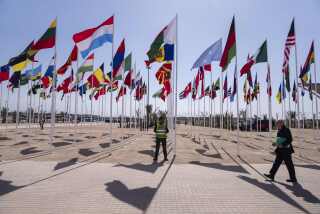More Pay for Fiscal Firefighters
- Share via
With dramatic flair, the Asia financial crisis shoved global goliaths such as the International Monetary Fund out of comfortable facelessness and into a gathering storm of controversy. Even so, to most Americans this esoteric institution still seems as remote and irrelevant as ever. Too bad. The inclination to ignore the IMF’s role in the world economy could have dangerous consequences for wage-earners everywhere. Instantaneous telecommunications technology, economic globalization and the sloshing of gigantic amounts of short-term foreign investment across national borders have rendered such unknown international bureaucracies as relevant to Mr. and Mrs. America as the neighborhood corner bank. And more powerful.
The question is, are institutions like the IMF, World Bank and Asian Development Bank up to the task of keeping the world economy together when a crisis might start to unglue it? Shortly after the IMF assembled bailout programs for several seriously troubled Asian economies, a band of critics, mainly economists and journalists uncowed by the institution’s formidable reputation, openly worried that the IMF’s rescue package would arrive too late. They also predicted that its prescriptions would be insufficiently tailored to the needs of economies operating in very different cultures. Predictably enough, the IMF, dipping into its deep well of institutional arrogance, scoffed at the criticism. But the often secretive Washington-based bureaucracy is no longer laughing. This month, in fact, the IMF publicly surfaced with a pair of almost candid reflections on its role, past and future, that left no doubt about the need for internal reform.
The most startling IMF revelation was the one issued last week in which it in effect agreed with some of its critics. The fund admitted to having “badly misgauged the severity of the downturn” and was willing to accept, in hindsight, that its programs “were not adequately financed to be carried out in an environment where the crucial effort to restore confidence had failed.” Such candor is salutary and raises the hope that, finally, the IMF may be motivated to reform. Hopeful, too, was the overall tenor of the second IMF revelation: a speech given in New York two weeks earlier by the IMF’s first deputy managing director Stanley Fischer. Remarking that the current crisis was caused by “panic-induced declines in the money stock . . . and herd behavior,” Fischer called for a reinvigorated and restructured IMF that would be adequately budgeted by member nations so as “to act rapidly to stem a crisis.”
Fischer says that “potential external shocks” like those we’ve already seen in Asia--the sudden withdrawal of foreign capital or roiling exchange rates--threaten world economic stability because of their scale and the speed with which they can occur. In order to achieve “a reduction in the frequency of panics,” he says, we need “market- based controls that seek to limit short-term capital in-flows.” Clearly, the idea under advancement is the IMF as a crisis credit union, able to pour prophylactic money on con-
Fischer’s proposal, which includes having member nations allocate more funds for crisis containment, is not an inherently outrageous idea. Today, in relation to world output, the IMF is only one-third as big as it was in 1945. As the world’s lending bank of last resort, it could prove a life-saving ally of troubled nations willing to undergo domestic reform--as is now the case for apparently recovering South Korea and Thailand. “We should expect that it will take at least five years until a new system . . . could begin operating,” he said. “We should not underestimate the complexity of the task.”
Sorry, but it could take a lot longer than five years if the idea fails to win widespread public support. President Clinton and responsible U.S. leaders need to start the educational process now. America has a huge stake in creating a world economy protected by alert buffer institutions from unnecessary implosions or explosions. Even so, a new, larger role for the IMF will be a hard sell. The issue is complicated, and when the U.S. presidential election starts to gain momentum, it will inevitably become politicized. The protectionists will paint the IMF as one big giveaway operation, conveniently forgetting that every single U.S. taxpayer dollar ever lent out by the IMF has been repaid to the lending countries’ treasuries, with interest. What’s needed now are large, liquid reserves that can be used quickly to cushion economic shocks.
The ability of the world to steer wide of large-scale panics and catastrophic recessions diminishes to the extent that the system leans largely on blind luck. But luck, and currently undercapitalized, admittedly flawed institutions like the IMF may be about all we have. And that’s far from enough. So, before we throw the IMF out the door because it’s far from perfect, perhaps we ought to improve it and fund it adequately. Otherwise, we may wake up and find ourselves faced with global economic shocks that could have been forestalled by early, decisive action.
*
Times contributing editor Tom Plate’s column runs Tuesdays. He teaches at UCLA. Email: tplate@ucla.edu.
More to Read
Inside the business of entertainment
The Wide Shot brings you news, analysis and insights on everything from streaming wars to production — and what it all means for the future.
You may occasionally receive promotional content from the Los Angeles Times.










